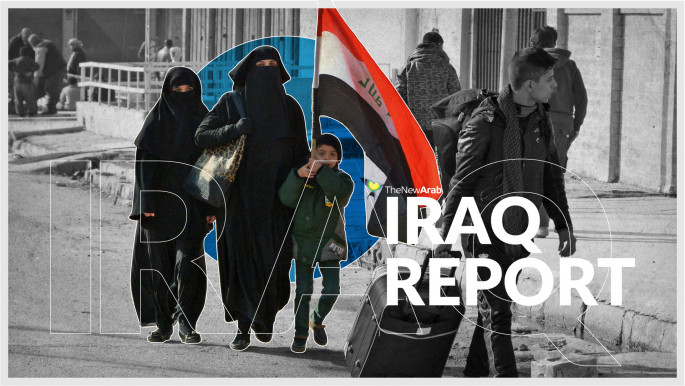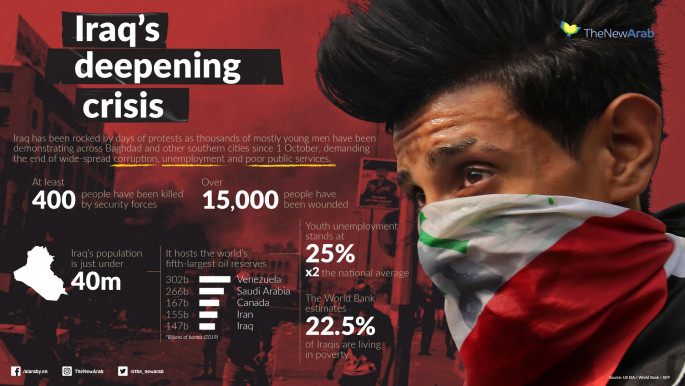The Iraq Report is a fortnightly feature at The New Arab.
Click below to see the full archive.
 |
As a result, Iraq has come under the thrall of Iran and is teetering on the precipice of civil strife once again as Iraqis continue their protest movement despite the resignation of former Prime Minister Adel Abdul Mahdi.
One of their key demands has been the end of the confessionalism that has plagued Iraqi politics for close to 17 years, yet they have consistently taken aim at Iran and demanded that their eastern neighbour cease interfering in their country’s affairs.
A web of intelligence snaring Iraq’s top players
Iranian intelligence cables leaked by The New York Times and The Intercept have caused a stir in recent weeks as officials in Tehran attempt to downplay the extent of their involvement in Iraq.
The leaks show a well-oiled Iranian intelligence machine capable of highly sophisticated operations designed to ensure that Iran remains the primary influencer of Iraqi affairs. This has allowed Iran to completely outmanoeuvre the United States and in turn gain primacy over Washington within the Iraqi strategic theatre.
This, of course, despite the fact that the present power holders in Iraq owe their current level of influence to the illegal US-led invasion and occupation of Iraq that began in 2003.
The intelligence cables were from Iran’s Ministry of Intelligence and Security (MOIS), the Iranian equivalent to the United States’ Central Intelligence Agency (CIA). MOIS operates in parallel to, and often in competition with, Iran’s other notorious agency, the Islamic Revolutionary Guard Corps (IRGC).
The IRGC is not only a parallel military force to the regular Iranian armed forces but it also operates its own intelligence service, primarily through the Quds Force Commander Major General Qassem Soleimani, an infamous and enigmatic figure who wields significant influence in Iraq, Syria, and Lebanon.
Read more: Top Iraq cleric Sistani says new premier must be chosen without 'foreign interference'
While it is unclear who leaked the tranche of cables to the press, the source said that they wanted to "let the world know what Iran is doing in my country Iraq".
Considering the amount of damage the leaks have caused to the Iranian establishment, it is therefore suspected that the source is an insider within the Islamic Republic's intelligence operations in Iraq, and was trusted to a significant enough degree to be granted access to sensitive covert intelligence files.
The damning reports show that MOIS operatives had meetings with several high-ranking military and political figures or their representatives, and were offered their loyalty in exchange for money and other favours. Others were described as enjoying a "special relationship" with Tehran.
For instance, Adel Abdel Mahdi himself was directly referred to in the cables as having "a special relationship with the IRI", an acronym for the Islamic Republic of Iran. This relationship was first alluded to when he was oil minister in 2014.
However, it is known that Mahdi worked closely with the Iranian regime while he was living in exile during the dictatorial reign of former Iraqi President Saddam Hussein. As a senior member of the Supreme Council for the Islamic Revolution in Iraq (SCIRI) – a group which later played a defining role in Iraq’s governing council and legislature – Mahdi has always been closely intertwined with the mullahs of Tehran.
Read more: Iran quietly smuggles missiles to Iraq amid protest chaos: report
Mahdi was not the only official named in the cables, with even senior security officials exposed to the allegation of selling out their country to a foreign power.
Lieutenant General Hatem Al-Maksusi, the now-retired commander of military intelligence in the Iraqi defence ministry, is reported to have sent a representative to a MOIS intelligence officer offering his services to Iran.
 |
Maksusi’s representative carried a message to the Iranians saying: "Greet the [Iranian] brothers and tell them we are at your service. Whatever [they] need we are at their disposal. We are Shia and have a common enemy…All of the Iraqi Army’s intelligence – consider it yours."
While the leaked intelligence is damaging to Iran, it is predominantly confirmatory rather than revelatory.
Experts and policymakers in a number of capitals around the world have long criticised Iran’s role in undermining Iraq’s already tenuous grip on democracy. Iran’s influence over Shia militias, politicians across the ethno-sectarian divide, and links to senior military and security figures has long been known.
 |
Iran therefore still perceives Iraq as not only its pliant neighbour, but seemingly also its strategic backyard from which it can continue to wage war by proxy. |  |
However, these leaks represent one of the first times the normally quite secretive Iran has been left so exposed. The denials of Iranian officials when faced with the allegation that they are meddling in the affairs of their neighbours, particularly Iraq, now ring hollow.
Protesters knifed as demonstrations rage on
Iran’s power and influence over its proxies in Iraq can still be actively seen to this day, as Tehran-sponsored militants stormed protest sites and set about stabbing protesters.
Some 25 anti-government demonstrators in Baghdad were stabbed by pro-Iran militiamen who are said to have been members of the Popular Mobilisation Forces (PMF), or Hashed al-Shaabi in Arabic, the paramilitary force that is now being seen as the Iraqi version of Iran’s IRGC.
Thousands of PMF fighters entered Baghdad’s Tahrir Square protest site and were seen using knives, screwdrivers, and other sharp implements to stab protesters in the back, abdomen, arms and legs. The Iran-aligned militants carried Iraqi flags as well as the banners of the PMF and its subsidiary organisations, including the extremist Shia Hezbollah Brigades.
Ironically, the militiamen also held aloft portraits of Grand Ayatollah Ali Sistani, Shia Islam’s most senior figure in Iraq and the man whose sermon was said to have led to the downfall of former premier Abdul Mahdi.
In this week’s Friday sermon delivered by his representatives, Sistani demanded that the country’s new prime minister must be selected "without foreign interference" – a clear reference to both Iran and the United States.
Some have pointed out that the Iranian-born Sistani’s comment can be seen itself to be foreign interference, and it is acknowledged that he wields significant and unelected power and influence over Iraq’s politics.
However, Sistani’s remarks definitively shows that Iran is not the only player in Iraq despite its dominance.
Clearly, however, Iran has no intention of heeding the demands of either the protesters or Sistani, amid The New York Times reports earlier this week that American military and intelligence officials had accused Iran of stockpiling missiles in Iraq to counter the US.
According to these American officials, "Iran has used the continuing chaos in Iraq to build up a hidden arsenal of short-range ballistic missiles in Iraq, part of a widening effort to try to intimidate the Middle East and assert its power."
"The missiles pose a threat to American allies and partners in the region, including Israel and Saudi Arabia, and could endanger American troops," the unnamed officials cited by the report said.
Iran therefore still perceives Iraq as not only its pliant neighbour, but seemingly also its strategic backyard from which it can continue to wage war by proxy against the United States.
While the US and Iran continue to play a deadly game of tug-of-war over Iraq, it is regular Iraqis who will pay the price as their country continues to be wracked by chaos, instability, and crippling corruption.